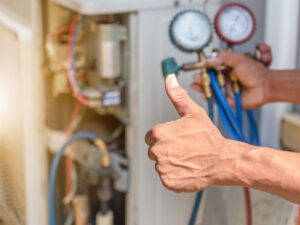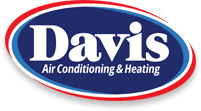Everything You Need to Know About Making Your HVAC System Energy-Efficient
In Katy, Texas, you can’t stop using your home’s HVAC system to save money. But, as technology advances, you can choose to buy new air conditioners and appliances that use energy more efficiently. Or, you can make upgrades to your current system and how you use it to decrease monthly energy bills and save yourself money. From checking insulation to closing curtains, you have many ways to make your Katy, Texas, home an energy-efficient place that saves you money.
Consider Appliance Purchases
When you need to buy new appliances, be sure to look for options that carry an Energy Star rating. This rating means that those appliances use energy more efficiently than other appliances. Especially consider those ratings with your air conditioner and HVAC system.
Check Weatherstripping
Weatherstripping is the rubber, felt, or metal material placed between your exterior door and the frame and between a window and its frame. Weatherstripping helps seal your home’s envelope and keeps conditioned air from escaping outside. A sealed home envelope reduces your energy bill because conditioned air stays inside, reducing the work your HVAC system must do to cool or heat your home.
Check weather-stripping annually since it doesn’t last forever. You can check the seal on your doors and windows with a blower door test, below. Or you can do a visual inspection of all weather-stripping and replace any areas that don’t have a proper seal.
Install a Smart or Programmable Thermostat
When set correctly, a programmable thermostat can save you 10 percent annually on your energy bill. One of the biggest mistakes homeowners make on energy use is not programming their thermostats correctly. Many myths surround thermostats and ways to cool or heat a home. Programming your thermostat to run when you’re home and not run while you’re away at work or on vacation saves you money on your energy bill.
Upgrading to a smart thermostat can save you more money on top of the 10 percent saved annually with a programmable thermostat. Before purchasing, balance how much you think you’ll save versus the cost of purchasing and installing a smart thermostat.
Use Ceiling Fans During Warm Temperatures
Many homeowners forget to use their ceiling fans to make their homes more comfortable. Your ceiling fan can add comfort any time of the year, but especially during the summer and fall.
During the fall, when the weather outside is getting cool, you can use your ceiling fan to keep the house comfortable without turning on the air conditioning. Fans can also move conditioned air around your home during the summer. This movement allows you to cool the house to a warmer temperature and saves money on your monthly energy bill.
Put Your Ceiling Fan to Work in Cold Temperatures
Your fan can also be used during the winter to keep your home warmer. Remember what you learned in elementary school about how warm air rises? During the winter, the air around your couch might feel cold because all the warm air is floating to the ceiling. If you turn on your ceiling fan, the fan will push that warm air down and distribute it around the room. Don’t forget to flip the switch on the side of your fan so that the fan spins clockwise during the winter and counterclockwise during the summer.
Do Some Planting
Trees and outdoor shrubs can help to shade your home throughout the year. By keeping the sun off of your roof during the summer, your home will naturally feel cooler. Shrubbery around the windows and in the backyard can also help to shade your home from sunlight.
Close the Curtains
Your curtains and drapes can be helpful in improving your HVAC system’s energy efficiency. During the summer, closing the curtains acts as a barrier to keep out the heat and sunshine and keep rooms cooler. At night, you may be able to open the windows and curtains to let in cool breezes.
During the winter, you’ll want to open the curtains during the day to let in as much sunlight as possible. Use the sunlight to keep rooms warm during the day. At night, close your curtains to offer an extra barrier to keep out the cold, outdoor air.
Check Your Insulation
If your home is more than 10 years old, it may need to have some added insulation. Insulation provides a barrier between your walls and the outdoors. Insulation also helps to keep conditioned air inside your home.
Insulation technology has greatly increased over the last 10 years with spray insulation. Older homes that have fiberglass insulation may need an update, but newer homes should be well-insulated structures.
Replace Windows
If you’re interested in putting a dent in your energy bill and you live in an older home, consider replacing your windows. Single-pane windows are less energy-efficient models than newer, double-pane windows. Before taking this step, consider not only the money saved with the improved energy use, but also the cost to purchase and install the windows.
Clean or Change Air Filters
One of the easiest ways that you can improve your HVAC system’s efficiency is to clean and replace air filters. When air filters are dirty, your air conditioner will have to work harder to pass conditioned air into your home. Clean or replace your filters every four to eight weeks, depending on the type of filter you use.
Check for Air Duct Leaks
Your home’s air ducts allow conditioned air to travel from the HVAC system to the rest of your home. If the air ducts aren’t properly insulated or sealed, you may have leaks, which can cost you money on your home energy bill. When checking your home’s air ducts, you might also notice that they could be in need of cleaning. You can easily schedule a duct-cleaning appointment with one of our Davis Air Conditioning and Heating technicians.
Dress Accordingly for the Season
This tip might seem obvious, but you should dress for the season inside your home to help your HVAC system work more efficiently. In the summer, wear shorts and light clothing. During the winter, bundle up with an extra layer to stay warm.
This thinking should also come into play during the night as well. In the winter, pile on the blankets. During the summer, give your HVAC system a break and sleep under cool cotton sheets.
Complete a Blower Door Test
A blower door test checks for leaks in your home’s envelope. A leak in this envelope will push conditioned air outside and raise your energy bills with no added comfort. To conduct a blower door test, an HVAC services specialist seals all windows and doors, then uses a specialized fan to blow air into your home. During the test, pressure measurements identify pressure changes, which can signify leaks. Once these leaks become identified, a service tech can fix them.
Schedule Annual HVAC System Maintenance
Your HVAC system should be checked annually by an HVAC services specialist. This annual checkup looks for small problems and helps your Davis Air Conditioning and Heating technician to identify any potential problems before they become large, expensive ones. Annual maintenance should help to prevent any expensive repairs and extend the life of your HVAC system, keeping it running properly for up to 10 years or longer.
Check Your Outdoor HVAC Unit
The outdoor unit of your HVAC system is also necessary to periodically maintain. Once every three months, make a visual check of your outdoor unit. Look for any physical damage or debris deposited on the unit. Trim any plants or shrubbery surrounding your outdoor unit to make sure you have proper space for ventilation so that your unit runs as efficiently as possible and doesn’t overheat. If your outdoor HVAC unit needs any other repairs, contact one of our service technicians for an appointment.
We hope that this guide will help you lower your energy bill and to make your home a more energy-efficient place. If you have any questions about maintaining your home HVAC system or want to schedule an annual maintenance appointment, call us at Davis Heating and Air Conditioning at 888-710-5530 in the Greater Houston Area or 888-929-0049 in Brazoria County.
Image provided by Shutterstock
You May Also Like

Is My Heat Pump in Fort Bend, TX, Low On Refrigerant?
Your heat pump hums through the cool January mornings in Fort Bend, TX, but something feels off. The air trickling from your… Continue Reading Is My Heat Pump in Fort Bend, TX, Low On Refrigerant?…

How Often Should I Change My HVAC Filter in Pasadena, TX?
The crisp winter air sweeping across Galveston Bay might feel refreshing outdoors, but inside your Pasadena, TX, home, your HVAC system works… Continue Reading How Often Should I Change My HVAC Filter in Pasadena, TX?…

Should I Repair or Replace My Furnace in Houston, TX?
The mercury’s dropped, your furnace is making strange sounds, and you’re wondering whether to nurse it back to health or send it… Continue Reading Should I Repair or Replace My Furnace in Houston, TX?…
